Ten years ago, Robert and Caitríona Cullen put an ad online to sell their homegrown hedging and trees. They got an order from Knock, three hours away, but with €600 worth of trees required, Robert and his father headed on.
“That was the first time we started doing delivery. They had a fry waiting for them in Mayo. His dad was shocking excited and it just took off from there,” Caitríona remembers.
Robert
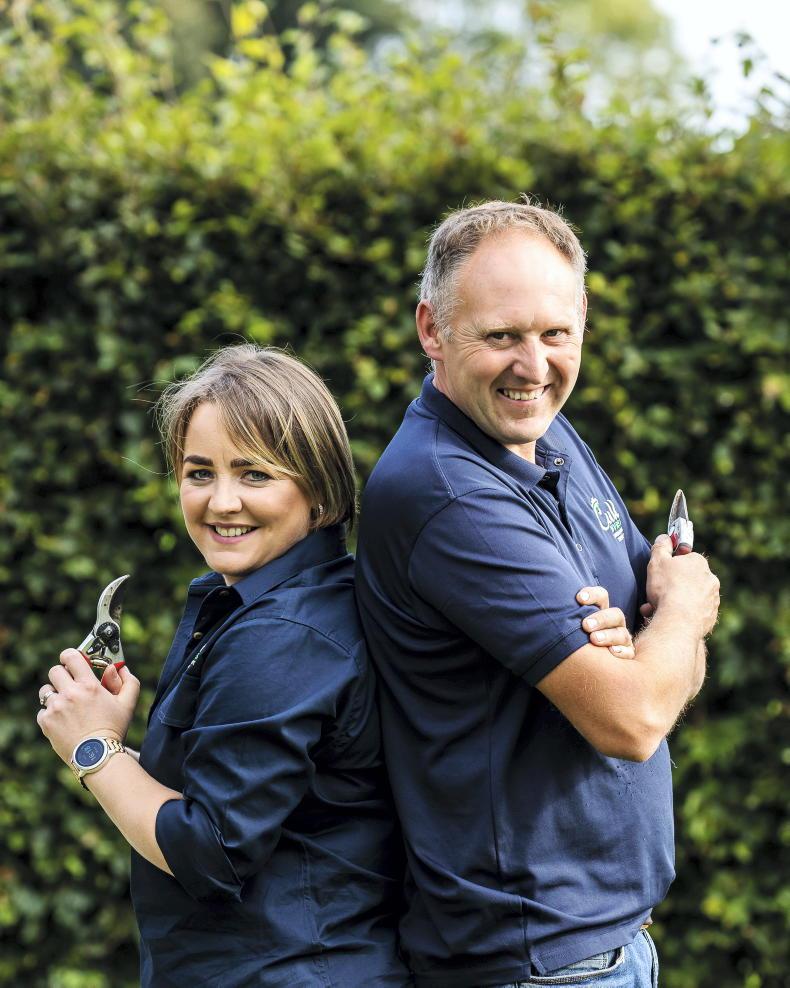
Robert’s father was always into trees and hedging, as the caretaker of Lisnavagh estate in Co Carlow.
“We lived in Hacketstown and probably had the smallest backyard in the village, but we used to grow lettuce down behind the priest’s house and sell them into Duffy’s supermarket for six pence a head,” he explains.
Following a year in Multyfarnham, Robert went landscaping, still renting land and then started growing “a little bit more stuff.” In 2008, he met Caitríona.
Caitríona
“I’m just from Knockananna,” she says, taking up the story.
“My dad was a part-time sheep and cattle farmer and I spent years standing in the wrong gap.”
Caitríona did biochemistry in UCD, worked in a lab for a year and hated it.

“We wanted to buy land for a house, but the recession had come and Liffey Meats were looking for someone, so I went there,” she says.
“We bought 11 and a half acres and we made hay that September. We took an acre for the house. There’s six acres of trees and we take a bit of land to graze the bullocks.”
The business
The Cullens grow native trees and hedging, mostly bare rooted plants, the whitethorns being the big seller. A small bare root whitethorn will cost you €50 per hundred. A sapling tree is €1 and the biggest trees the Cullens do are 12ft, ranging from €25 to €30.
Although the Cullens cater for anyone who wants to buy trees, it was farmer who really grew the business for them.
“The REPS, GLAS, and particularly AEOS, were very good for us. I’d say 70% of our business is with farmers, an awful lot to the west of Ireland. And it’s all native.”
Robert says that some people might give out the first few times you’d bring in stuff, but this is short-lived when they start to see progress in the trees.
“It’s amazing, there are lads that would have never planted a tree. And then they just get into it and think, ‘It’s doing so well, I’m going to plant more.’ And there might be no schemes.”
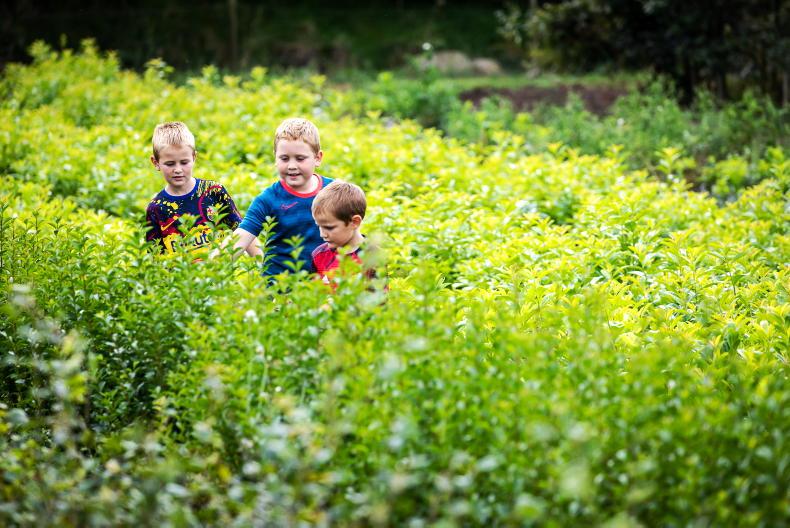
The delivery is a big element of the service.
“We’ve nothing against couriers, but it just works out better to do it ourselves,” says Robert. “You’re taking plants fresh out of the ground into a bag and getting them to a person within a day. And then at least if they plant them straightaway, there’ll be very little failures.”
Coming together
Caitríona left Liffey Meats in 2019. “We were kind of like ships in the night. I was the quality manager and although it was a great place to work, very accommodating that I was a working mammy, it was very demanding. Sometimes it was easier to go back to work when the kids were in bed,” she says.
Although Robert’s business was growing, Caitríona felt that they were putting a pause button on it for her job, and with no work life balance, it just didn’t make sense.
So she walked away from it and freely admits that this was no easy decision.
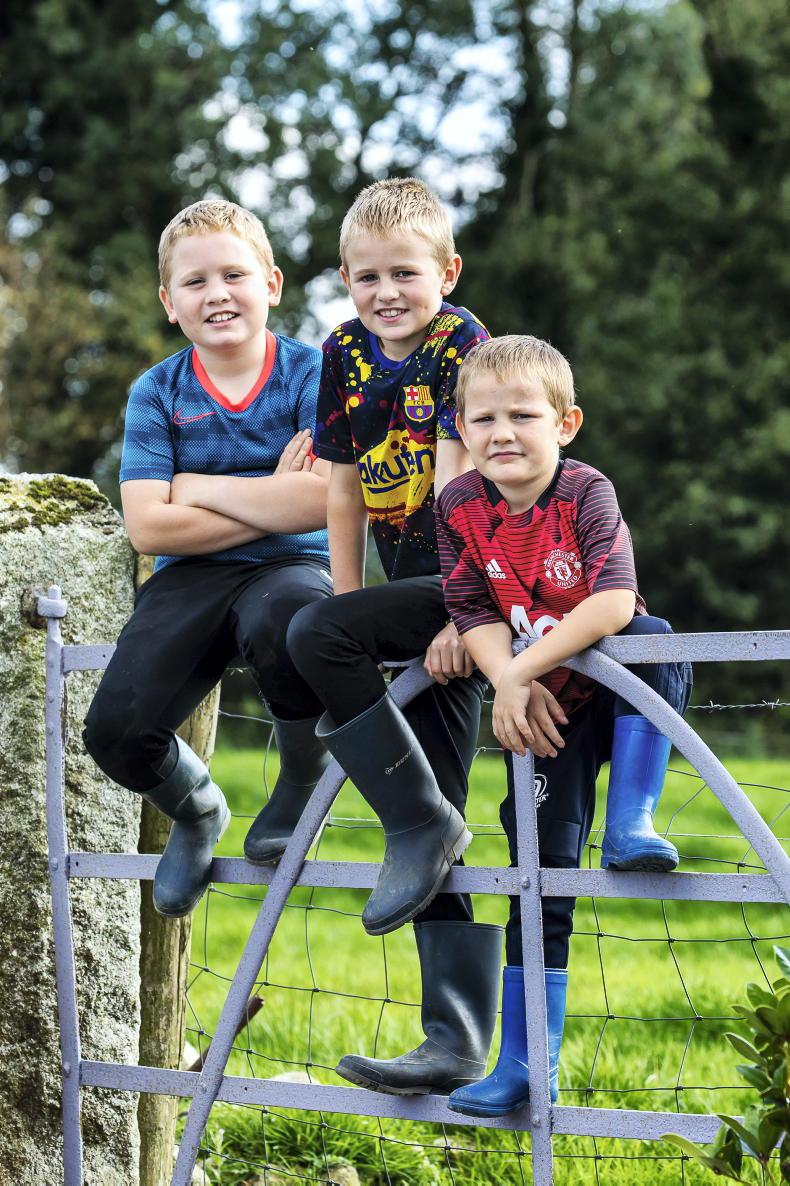
“It was a big change. I’d gone from 30 men who’d do what you told them to three men who just say ‘no!’” she says.
“I got a little part-time job and then COVID-19 came and suddenly I was back at home with the lads (Rory, 8; Joe, 6 and Bobby, 10).
“With COVID-19, we were at home, not running to summer camps and all the other stuff, so I was the one out staking the trees and tying them up and doing the weeding and the pruning to take the pressure off Rob.”
The future
The Cullens also used the time to talk to the Local Enterprise Office (LEO) about marketing, mentoring and LEAN programmes for business in an effort to address those things that get “kicked down the road.” A new website, with funding, was one result of this interaction with LEO.
“I always tell Rob: ‘Look after the land and the land will provide’. Our motivation is to be able to support ourselves, pay the bills, have a nice holiday once a year and still have something that’s ours,” says Caitríona.
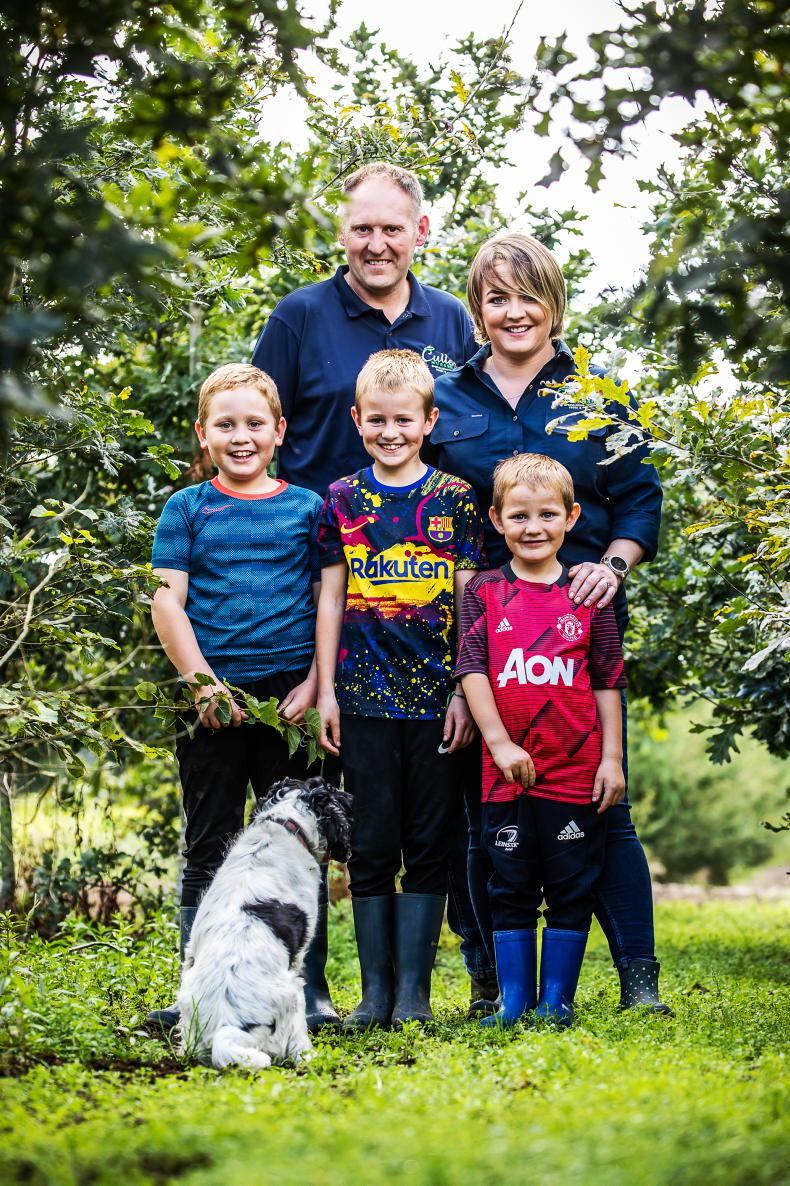
“We are expanding every year. It’s hard, you could put in something that’s hot now and in three years’ time, who knows – it’s a gamble that way. We were growing ash for the AEOS and we had hundreds of them out there. Lovely big trees, fit and ready for sale, and ash dieback came and we couldn’t stir them, although they were clean. We eventually just had to dig them up and burn them.”
Bringing skills to the table
So has the biochemistry been parked? We ask Caitríona, and get an emphatic, “Yes”.
Caitríona has benefited from continuous training throughout her working life. A job in an engineering company trained her in bookkeeping, and in Liffey she learned HACCP and auditing. All of that, she has brought into Cullen nurseries.
“It’s not always easy when you live together, when you’re married, when you’re working together. I’m a very strong character, but at the end of the day, he is the one that knows what he’s talking about. That’s how we’re making money - it’s his knowledge, his brain power, his hands. I have to take guidance from him and at the same time, he takes guidance from me. I’m not always right either.”
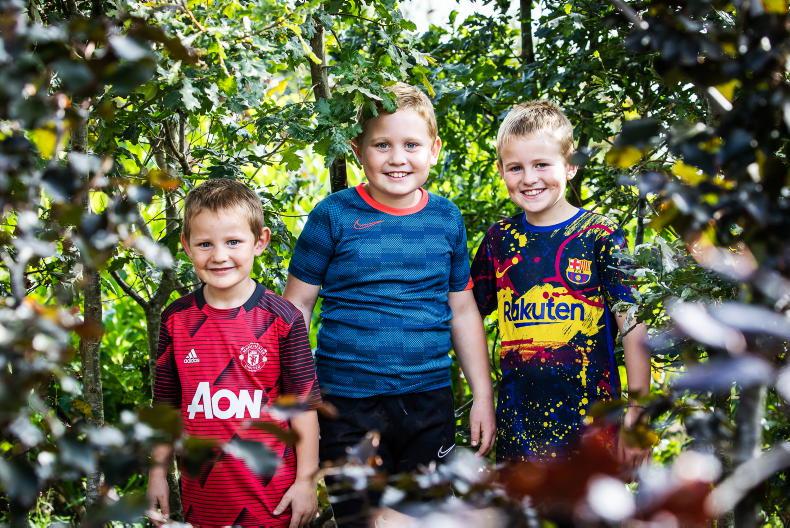
Robert doesn’t disagree, and smiling, notes: “Look you can have all the letters after your name, but if you’re not out there actually doing it, things can go wrong and you’re learning the whole time.”
Knowing your role
Caitríona believes in the importance of clearly defined roles rather than “well I was expecting you to do that” and “you should have done that”.
“Rob loves the work, I do cash-flow projections and forecasts. I am conscious of keeping money coming in. You’ll run out of money before you’ll run out of work,” she says.
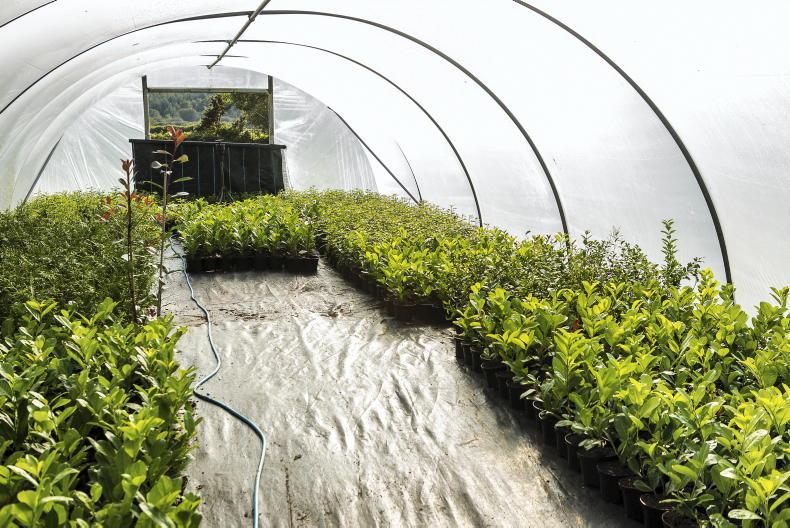
“And another thing - I’m not afraid anymore to ring people looking for the money that they owe us. After 10 years in Liffey, I’m well able to talk to farmers and they love a bit of banter as well. ‘Ah it’s yourself, you’re hardly looking for money?’ And I go, ‘Well your cattle need to be fed and my chaps need to be fed.’
“You could be busy the whole time and if you don’t gather the money, it’s really pointless. No cashflow, no business.”
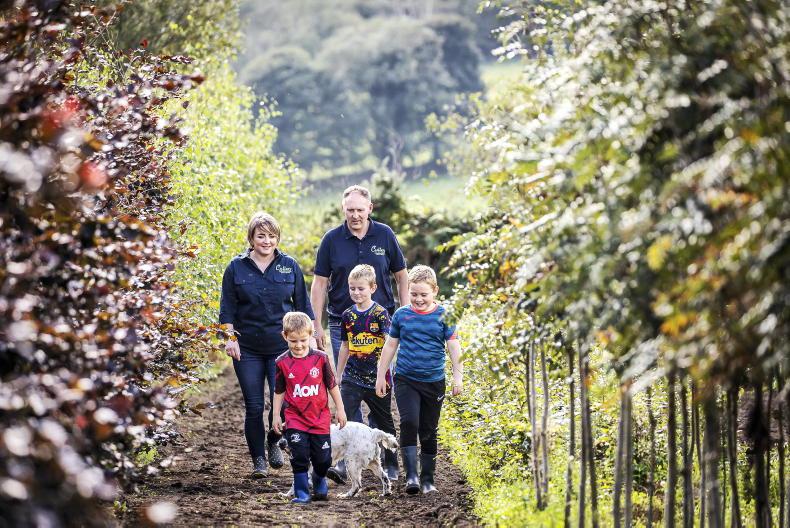
The Cullens have a herd of Limousin and Charolais cattle, bought in April at 12-14 months at around 400kg, with an aim to be factory fit by the following April.
Robert is stoic about their place, aside from providing a quality fertiliser for the trees.
“They are holding their own. We’re not losing any money on them. I look at it as a savings scheme, being honest with you. We’re paying as we go along. And then when we sell, we get a good lump of money.
“I see the problem with too many hobby cattle going into the factory, the guy who needs to make money from them can’t. If I pay a few extra pound for cattle, it’s not going to break me. Now I know several lads – retired – that keep a few cattle. They’re the boys giving the big money for fancy cattle. But it’s a hobby and people don’t want to go out of it.”
The majority of the cattle were recently sold, or as Caitríona describes it “liquidated” for the purchase of eight acres that the Cullens had been renting.
This expansion will allow Caitríona to continue working full-time in the business.
“We can’t believe the demand. We have been building our reputation all the way along, but the little bits of the jigsaw are coming together now.
With this purchase, Cullen nurseries will grow from six acres to 14 acres, while still retaining five acres to “rebuild the herd”.
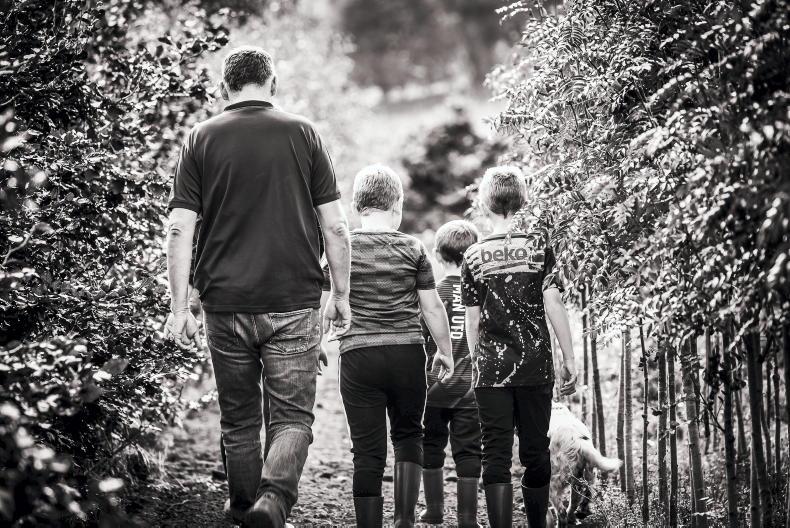
Trust your gut instinct – it rarely lies. Clearly defined roles – each person needs to know the areas and tasks that they are responsible for. Write it down – we have made so much progress and improvements from writing down what needs to be done, realistic timeframes and the expected costs of these improvements. Talk to each other – everyone being informed of what is going on is important. Look for help – there are great agencies providing support. Not all of them will be the right fit, but there is much to be learned from the one that is right for you. Successes
How far we have
come, from living in a mobile
home down an overgrown lane
in 2010 to a lovely home, three
healthy children and working
together growing our business in 2020. Combining our individual
skillsets to work together to
expand our business around
our family life. Failure
Like all businesses we
have had set backs. We
lost nursery stock and suffered
damage through storms, but we
have learned from that and
put in better systems to
minimise damage
in the future.
The first step is the one that takes the most courage. Leaving a good job was a big step and a difficult decision to make, but we haven’t looked back since.
Read more
Mackinnon has positive influence on nursery survival
Ash dieback-resistant trees discovered by scientists
Ten years ago, Robert and Caitríona Cullen put an ad online to sell their homegrown hedging and trees. They got an order from Knock, three hours away, but with €600 worth of trees required, Robert and his father headed on.
“That was the first time we started doing delivery. They had a fry waiting for them in Mayo. His dad was shocking excited and it just took off from there,” Caitríona remembers.
Robert

Robert’s father was always into trees and hedging, as the caretaker of Lisnavagh estate in Co Carlow.
“We lived in Hacketstown and probably had the smallest backyard in the village, but we used to grow lettuce down behind the priest’s house and sell them into Duffy’s supermarket for six pence a head,” he explains.
Following a year in Multyfarnham, Robert went landscaping, still renting land and then started growing “a little bit more stuff.” In 2008, he met Caitríona.
Caitríona
“I’m just from Knockananna,” she says, taking up the story.
“My dad was a part-time sheep and cattle farmer and I spent years standing in the wrong gap.”
Caitríona did biochemistry in UCD, worked in a lab for a year and hated it.

“We wanted to buy land for a house, but the recession had come and Liffey Meats were looking for someone, so I went there,” she says.
“We bought 11 and a half acres and we made hay that September. We took an acre for the house. There’s six acres of trees and we take a bit of land to graze the bullocks.”
The business
The Cullens grow native trees and hedging, mostly bare rooted plants, the whitethorns being the big seller. A small bare root whitethorn will cost you €50 per hundred. A sapling tree is €1 and the biggest trees the Cullens do are 12ft, ranging from €25 to €30.
Although the Cullens cater for anyone who wants to buy trees, it was farmer who really grew the business for them.
“The REPS, GLAS, and particularly AEOS, were very good for us. I’d say 70% of our business is with farmers, an awful lot to the west of Ireland. And it’s all native.”
Robert says that some people might give out the first few times you’d bring in stuff, but this is short-lived when they start to see progress in the trees.
“It’s amazing, there are lads that would have never planted a tree. And then they just get into it and think, ‘It’s doing so well, I’m going to plant more.’ And there might be no schemes.”

The delivery is a big element of the service.
“We’ve nothing against couriers, but it just works out better to do it ourselves,” says Robert. “You’re taking plants fresh out of the ground into a bag and getting them to a person within a day. And then at least if they plant them straightaway, there’ll be very little failures.”
Coming together
Caitríona left Liffey Meats in 2019. “We were kind of like ships in the night. I was the quality manager and although it was a great place to work, very accommodating that I was a working mammy, it was very demanding. Sometimes it was easier to go back to work when the kids were in bed,” she says.
Although Robert’s business was growing, Caitríona felt that they were putting a pause button on it for her job, and with no work life balance, it just didn’t make sense.
So she walked away from it and freely admits that this was no easy decision.

“It was a big change. I’d gone from 30 men who’d do what you told them to three men who just say ‘no!’” she says.
“I got a little part-time job and then COVID-19 came and suddenly I was back at home with the lads (Rory, 8; Joe, 6 and Bobby, 10).
“With COVID-19, we were at home, not running to summer camps and all the other stuff, so I was the one out staking the trees and tying them up and doing the weeding and the pruning to take the pressure off Rob.”
The future
The Cullens also used the time to talk to the Local Enterprise Office (LEO) about marketing, mentoring and LEAN programmes for business in an effort to address those things that get “kicked down the road.” A new website, with funding, was one result of this interaction with LEO.
“I always tell Rob: ‘Look after the land and the land will provide’. Our motivation is to be able to support ourselves, pay the bills, have a nice holiday once a year and still have something that’s ours,” says Caitríona.

“We are expanding every year. It’s hard, you could put in something that’s hot now and in three years’ time, who knows – it’s a gamble that way. We were growing ash for the AEOS and we had hundreds of them out there. Lovely big trees, fit and ready for sale, and ash dieback came and we couldn’t stir them, although they were clean. We eventually just had to dig them up and burn them.”
Bringing skills to the table
So has the biochemistry been parked? We ask Caitríona, and get an emphatic, “Yes”.
Caitríona has benefited from continuous training throughout her working life. A job in an engineering company trained her in bookkeeping, and in Liffey she learned HACCP and auditing. All of that, she has brought into Cullen nurseries.
“It’s not always easy when you live together, when you’re married, when you’re working together. I’m a very strong character, but at the end of the day, he is the one that knows what he’s talking about. That’s how we’re making money - it’s his knowledge, his brain power, his hands. I have to take guidance from him and at the same time, he takes guidance from me. I’m not always right either.”

Robert doesn’t disagree, and smiling, notes: “Look you can have all the letters after your name, but if you’re not out there actually doing it, things can go wrong and you’re learning the whole time.”
Knowing your role
Caitríona believes in the importance of clearly defined roles rather than “well I was expecting you to do that” and “you should have done that”.
“Rob loves the work, I do cash-flow projections and forecasts. I am conscious of keeping money coming in. You’ll run out of money before you’ll run out of work,” she says.

“And another thing - I’m not afraid anymore to ring people looking for the money that they owe us. After 10 years in Liffey, I’m well able to talk to farmers and they love a bit of banter as well. ‘Ah it’s yourself, you’re hardly looking for money?’ And I go, ‘Well your cattle need to be fed and my chaps need to be fed.’
“You could be busy the whole time and if you don’t gather the money, it’s really pointless. No cashflow, no business.”

The Cullens have a herd of Limousin and Charolais cattle, bought in April at 12-14 months at around 400kg, with an aim to be factory fit by the following April.
Robert is stoic about their place, aside from providing a quality fertiliser for the trees.
“They are holding their own. We’re not losing any money on them. I look at it as a savings scheme, being honest with you. We’re paying as we go along. And then when we sell, we get a good lump of money.
“I see the problem with too many hobby cattle going into the factory, the guy who needs to make money from them can’t. If I pay a few extra pound for cattle, it’s not going to break me. Now I know several lads – retired – that keep a few cattle. They’re the boys giving the big money for fancy cattle. But it’s a hobby and people don’t want to go out of it.”
The majority of the cattle were recently sold, or as Caitríona describes it “liquidated” for the purchase of eight acres that the Cullens had been renting.
This expansion will allow Caitríona to continue working full-time in the business.
“We can’t believe the demand. We have been building our reputation all the way along, but the little bits of the jigsaw are coming together now.
With this purchase, Cullen nurseries will grow from six acres to 14 acres, while still retaining five acres to “rebuild the herd”.

Trust your gut instinct – it rarely lies. Clearly defined roles – each person needs to know the areas and tasks that they are responsible for. Write it down – we have made so much progress and improvements from writing down what needs to be done, realistic timeframes and the expected costs of these improvements. Talk to each other – everyone being informed of what is going on is important. Look for help – there are great agencies providing support. Not all of them will be the right fit, but there is much to be learned from the one that is right for you. Successes
How far we have
come, from living in a mobile
home down an overgrown lane
in 2010 to a lovely home, three
healthy children and working
together growing our business in 2020. Combining our individual
skillsets to work together to
expand our business around
our family life. Failure
Like all businesses we
have had set backs. We
lost nursery stock and suffered
damage through storms, but we
have learned from that and
put in better systems to
minimise damage
in the future.
The first step is the one that takes the most courage. Leaving a good job was a big step and a difficult decision to make, but we haven’t looked back since.
Read more
Mackinnon has positive influence on nursery survival
Ash dieback-resistant trees discovered by scientists










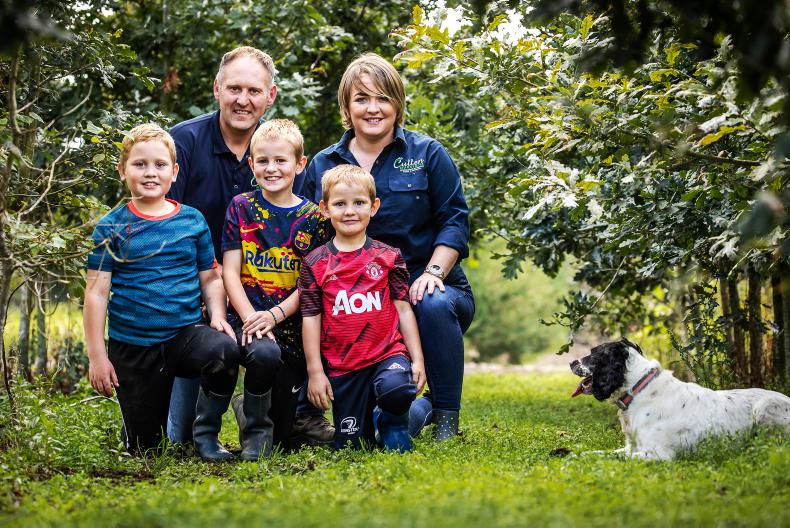





 This is a subscriber-only article
This is a subscriber-only article





SHARING OPTIONS: